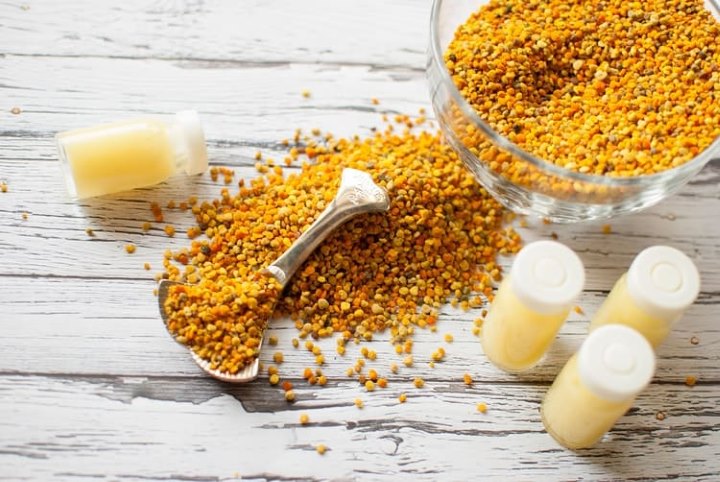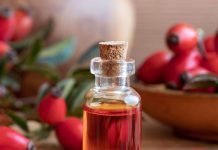Bee pollen has been a natural wonder for centuries. This golden elixir, collected by honeybees from the male seed of flowers, has gained attention in recent years for its potential positive effects on women’s fertility. Let’s look into the fascinating world of bee pollen that can affect women and couples who are looking to conceive. Through this article, we will discuss the matter, discover the advantages, side effects, and risks, and give suggestions on how bee pollen can be used to enhance fertility in women.
In This Article:
- What Is Bee Pollen?
- Benefits of Bee Pollen for Women’s Fertility
- Side Effects and Risks of Bee Pollen
- How to Enhance Fertility with Bee Pollen?
- Recommended Dosage
What Is Bee Pollen?
Bee pollen is a delicious blend of pollen and nectar that is collected by the worker bees from the flowering plants. Once collected, the bees’ enzymes are mixed with it, and it’s placed in a honeycomb. Bee pollen is a superfood due to its high nutritional value, including proteins, lipids, vitamins, and minerals. It has been the case since mediaeval times that healing practices with food are recommended; however, it is now a concept that has become fairly well established that food itself can be a healing agent, especially regarding fertility.
Benefits of Bee Pollen for Women’s Fertility
Full of Vitamins:
Bee pollen is a rich source of all the vitamins and minerals that reproductive health demands to be adequate. These food materials give support to the functioning of organs of the reproductive system and the hormones that control their balance.
Regulated Hormones:
Bee pollen contains substances that can help women correct themselves in cases where the hormones are not balanced. Hormonally balanced organisms are, of course, necessary when it comes to the goal of ovulation and healthy pregnancy in general.
Quality of Eggs is Better:
Some research indicates that bee pollen can help in the production of more and healthier eggs in women, which is crucial for conception and ongoing healthy pregnancy.
Less Inflammation:
Bee pollen is a natural supplement that has anti-inflammatory compounds that can lower inflammation levels in the reproductive parts of the body, thus setting the scene for a better chance of conception.
Energy Source:
Infertility is a time of great stress and physical as well as mental fatigue for many women. Bee pollen, as popular belief suggests, might give an individual the energy they need naturally.
Side Effects and Risks of Bee Pollen
Allergic Reactions:
The major side effect of bee pollen is the risk of developing allergic reactions. Some people will experience milder symptoms of itching and hives, whereas some severe cases show the patient is getting a life-threatening anaphylactic shock.
Problem with Digestion:
Some people could have such problems as diarrhoea, constipation, or stomach cramps associated with bee pollen consumption. As a consequence of the high fibre content in bee pollen, not everyone’s digestive tract is capable of accepting it.
Drug Interaction: Bee pollen can, at times, interfere with the action and metabolism of certain drugs, such as blood thinners as well as immunosuppressants. In the case of patients who are under pharmaceutical treatment, part of their dietary changes will be adding bee pollen intake.
Liver Toxicity:
Pollen is somewhat associated with the toxicity of the liver in a small number of cases. This happens when the bee pollen has been taken in an excessive amount for a long time. This is why it is always a good idea to use it only once or twice a day and with meals.
Pollen’s content:
Environmental toxins can be present in bee pollen, for they get it from air or were left in the beehive by humans, as well as the waxes, which are made of heavy metals. A person should choose a supplier who has top-quality control rules if they want safe bee pollen.
Hazards in pregnancy:
In connection with pregnant women and those who are trying to get pregnant, the careful way of dealing with bee pollen should be specially mentioned. Currently, there is insufficient data on the subject of bee pollen safety and its impact on the foetal period.
How to Enhance Fertility with Bee Pollen?
In spite of this, bee pollen may be introduced as a natural fertility approach. If you intend to use the bee pollen to improve your fertility, it is important to keep in mind that you ought to take it in accordance with the healthcare provider’s instructions.
Here are some essential points:
- Quality always comes first: Buyers should indeed ensure that they find the purest, highest-quality honey, grown in the best environment where no pesticide is to be found.
- Allergy test procedure: One of the significant steps that one should take before taking in bee pollen is to go for allergy testing so as to ascertain that nothing serious is going to happen to you.
- Moderation: Begin with small amounts, and if you can tolerate it, then continue with slow incrementations. Through this, you can cause no harm and still get the same benefits.
- Consultancy: In most cases, it is advisable that a healthcare professional should be consulted to someone under treatment or who has underlying health conditions need help. Each person is unique, and so healthcare providers need to explore patients’ health, age, and medical history to make a decision.
- Balanced Approach: Thus, while bee pollen might have positive impacts on fertility, it should be taken as just an aspect of a comprehensive fertility-boosting programme that includes proper eating habits, regular exercise, and good stress control.
Recommended Dosage
The right dose of bee pollen in connection with fertility can be totally different from person to person, and that can be caused by differences in age, weight, and general health. To avoid any dangers, just begin with a small amount of it and then slowly increase the dose that you can cope with. Moreover, sticking to the exact dose outlined by the healthcare provider is necessary for the drug’s safety and effectiveness.
Conclusion
In conclusion, the possible use of bee pollen for humans on their fertility journey has called the attention of the public. Despite the fact that bee pollen is a great source of vitamins, minerals, and other important substances that bodies need in the diet, the impact of bee pollen on fertility is still a puzzle. All the same, in relation to taking bee pollen as a part of the path to fertility, the patient needs to combine it with a qualified medical opinion before they make any decisions, especially those who have multiple food allergies and other health complaints.
Sources:
- https://www.santamonicafertility.com/blog/bee-pollen-for-fertility













